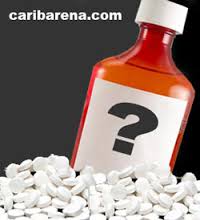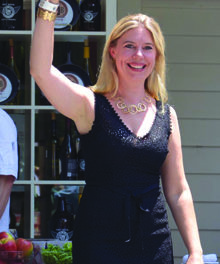 Got labels?
Got labels?
According to MedicineNet.com,“In the United States, the regulations of the Food and Drug Administration permit physicians to prescribe approved medications for other than their intended indications. This practice is known as off-label use.”
Physicians might prescribe Nadolol, for example, for migraine headaches rather than (more conventionally) for high blood pressure. Using aspirin to prevent heart attacks instead of for treating headaches is another example. I’d like to broaden this medical definition of going off label to include a range of behaviors that go beyond established boundaries, bend if not break the rules, or otherwise illustrate someone marching to the beat of a different drum.
Â
Some of our finest military leaders, in this sense, sometimes went ‘off label.’ General Terry Allen, for example, racked up a stellar WWII leadership record in North Africa and Sicily. His commanding officer, the great four-star Omar Bradley, considered him immensely talented. However, “ . . . Allen seemed to think that because his men had seen more combat than anybody else, they were excused from the rules everyone else had to follow . . . On at least one occasion, the Army telephone operator overheard a greatly agitated Bradley saying, ‘Allen, let me remind you that I am your Corps commander,’ to which Allen responded by hanging up.” (Jonathan Jordan, “Brothers*Rivals*Victors”; NY: New American Library, 2011)
Whaaat? He hung up on him? Holy smokes. I distinguish going off label from mislabeling, such as packaging circular stingray wing cutouts as “scallops.” Mislabeling can be dangerous, as when products contain potential allergens such as peanuts with no such indication on the label. You could take a real shelling.
Back to the Second World War. Our Supreme Allied Commander, General Dwight Eisenhower, was under soul crushing strain as he orchestrated our fight against the Axis powers in Europe. As Mr. Jordan noted, “Ike knew he would need help, and lots of it, to handle the immense stress of his immense jobs, and he knew that this help would have to come from someplace other than a cigarette pack or an officers’ club bar.”
In an effort to stay balanced and healthy, Eisenhower took on various assistants. One convivial fellow, Lt. Commander Harry Butcher, was an old golfing pal from CBS who was approved by no less than our top Navy man, Admiral Ernie King, to serve as Ike’s “naval aid.” Not your typical naval aid, mind you, rather someone to haul him off to play golf, of course, but also to “toss a baseball with him, get him to sketch or paint . . . and organize long, unwinding bridge sessions with aides, deputies, Red Cross Girls—anyone who could keep Ike’s mind from going dull with overwork and despair” (Jordan, p. 58). Seems to me most of us could use a Harry Butcher in our lives . . . or a Harriet. Americans are great at thinking “outside the box,” aren’t we?
Butcher’s assignment reminds me of how often large companies have talented people who excel at off label or even off-book activities. They might function as troubleshooters, but I’ve really never seen a job description for a “troubleshooter.” Or a corporate wine taster, yet I knew a fellow whose formal job description concerned communications—at which he excelled– but who nevertheless tasted wine for a living a small but important part of the time, among various other oddball if useful services that he happily provided.
There are plenty of other interesting examples of going off label professionally. Take the case of people who build stellar careers around a valuable skill set and yet achieve fame for other talents entirely. The ferociously effective politician and war leader Winston Churchill comes to mind. He also happened to excel at writing history and, oh by the way, became known as a fine painter who quite possibly could have succeeded in life on that basis alone. We also have singers and actors like Tony Bennett, Johnny Depp and Jane Seymour who additionally paint like the dickens. Note we’re not counting the anonymous clerk or tax attorney who also bowls or shoots pool like a pro. Or how about your cousin Bobby the hockey referee who’s also good at breaking up barroom brawls . . . or is that basically the same thing?
Then of course we have countless cases of words that are used off label, that is, well outside their original definitions. Horseplay comes to mind, as people seldom seem to play like horses (when they’re sober, anyway). Or hog wild, which has perhaps nothing to do with wild hogs. And we have “bibble,” which just sounds off label but among a string of odd definitions simply means to drink often or to eat or drink noisily. Can we add bibble snapper to the language, as we could use a term for little kids who make gross sounds when they plunge into a favorite food? Just one more example like this and that would be winklepicker, a 1950’s shoe style with a long, sharply pointed toe.
Getting back to off brand products, the lowly hairpin has an interesting history. About a hundred years ago, a series of monthly contests challenged readers to submit ideas for “alleviating everyday inconveniences,” such as recycling an old automobile tire. When it came to generating uses for extra hairpins, readers just ran hog wild, coming up with everything from using them to repair a broken fan belt to converting them to test tube holders and even using them as a finger splint (thanks, doc!). The first prize winner figured out how to turn a wire hairpin into a working resistor. Move over, Edison.
In the helpful Heloise department, Americans remain the world champs. We figure that beer can marinate meat, grow better looking grass, kill slugs, polish gold or furniture or hey, serve as a refreshing beverage when you’re in a pinch at a ballgame. Likewise, we’ve conjured lots of additional ways to use baby wipes, including blotting up spilled coffee from a rug or carpet, cleaning shoes, or soothing scrapes and bruises. And how about using a hair dryer to remove candle wax from a table or counter top, thaw frozen windows, or dry the inside of rubber gloves. Or bird feeder as I did last week? Brilliant, eh?
But shouldn’t we draw the line somewhere? Products should present themselves honestly. Some food purveyors cross the line when they suggest they contain something people like when in reality they contain no such thing. Now I really love coffee and use creamers. They often contain sodium caseinate which is a milk derivative, and the label on my brand tells me in small print that “this is a non-dairy product.” But come on, guys. A more flagrant offender is Kellogg’s Frosted Mini Wheats Strawberry Delight, which actually contains no strawberries, and their other so called berry cereals contain about as much fruit as a jug of paint remover.A company spokesperson admitted this lack of real fruit, citing a “confidential and proprietary” mix of flavors. Yum!
As a society, we sometimes shy away from “labeling” people. To label can be prejudicial and reflect an unfairly narrow perspective. Going off label, though, is quite another matter. A boatload of innovation may often result. Label that ship the Creativity Queen, perhaps, as long as there’s real fruit in the cargo hold.
Jack Sparacino earned a Ph.D. in psychology from The University of Chicago and later worked as a post-doctoral research fellow at Ohio State University in the business school. He is retired from United Technologies Corporation, Sikorsky Aircraft division and lives with his wife Jane and their two Yorkies on Saint Helena Island. He tries his best to catch a lot of fish, especially when sons Jack and Greg visit, stay off ladders, read only great books and write clearly. Sometimes he succeeds.







